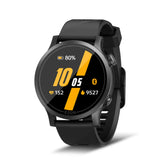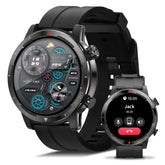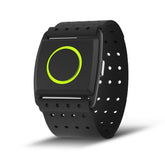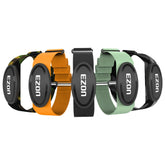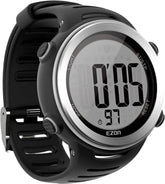マラソントレーニングガイド: 総合的なアプローチ
マラソンのトレーニングは、慎重な計画、献身、適切なツールを必要とする重要な取り組みです。マラソントレーニングへの総合的なアプローチには、よく構成されたトレーニングスケジュールだけでなく、適切な栄養、怪我の予防、そして成功を確実にするためのテクノロジーの使用も含まれます。この包括的なガイドでは、これらの重要な要素について説明し、 マラソントレーニングウォッチ、 最長バッテリースポーツウォッチ、 最高のGPSスポーツウォッチなどのツールが、あなたの旅全体を通してどのようにサポートできるかを強調します。
マラソントレーニングスケジュールの作成
よく構成されたトレーニング スケジュールは、持久力を高め、26.2 マイルのマラソン距離に体を準備するために不可欠です。ここでは、徐々に走行距離を増やし、さまざまな種類のトレーニングを組み込んだ 16 週間のトレーニング プランを紹介します。
1~4週目: 基地建設
目標: トレーニングのための強固な基盤を確立します。
-
週間スケジュール:
- 月曜日:休息またはクロストレーニング(水泳、サイクリング)
- 火曜日:短距離ランニング(3〜5マイル)
- 水曜日:クロストレーニング(30〜45分)
- 木曜日:中距離ラン(4〜6マイル)
- 金曜日:休息
- 土曜日:長距離走(6~8マイル)
- 日曜日:リカバリーラン(2〜3マイル)
5~8週目: 走行距離と強度の増加
目標: 毎週の走行距離を徐々に増やし、スピードワークを導入します。
-
週間スケジュール:
- 月曜日:休息または軽いクロストレーニング
- 火曜日:テンポラン(チャレンジングなペースで5~7マイル)
- 水曜日:クロストレーニング(45〜60分)
- 木曜日:短距離ラン(5〜7マイル)
- 金曜日:休息
- 土曜日:長距離走(10~12マイル)
- 日曜日:リカバリーラン(3〜4マイル)
9~12週目: ピークトレーニング
目標: 持久力を高め、レース条件に備える。
-
週間スケジュール:
- 月曜日:休息またはクロストレーニング
- 火曜日:スピードインターバル(インターバルあり6~8マイル)
- 水曜日:クロストレーニング(60分)
- 木曜日:中距離ラン(6~8マイル)
- 金曜日:休息
- 土曜日:長距離走(14~18マイル)
- 日曜日:リカバリーラン(4〜5マイル)
13~16週目: テーパリングと準備
目標: レース当日までに身体を回復させるために走行距離を減らします。
-
週間スケジュール:
- 月曜日:休息
- 火曜日:短距離ランニング(4〜6マイル)
- 水曜日:クロストレーニング(30〜45分)
- 木曜日:短距離ランニング(3〜5マイル)
- 金曜日:休息
- 土曜日:長距離走(13週目に8~10マイル、その後は徐々に距離を短縮)
- 日曜日:リカバリーラン(2〜3マイル)
マラソントレーニングのための栄養計画
適切な栄養は、トレーニング計画をサポートする上で重要な役割を果たします。考慮すべき重要な栄養戦略は次のとおりです。
1. 炭水化物摂取
持久力アスリートにとって、炭水化物は主な燃料源です。マラソン前の数週間は、グリコーゲン貯蔵量を増やすために複合炭水化物(全粒穀物、果物、野菜)の摂取量を増やすことに重点を置いてください。
2. バランスの取れた食事
以下のものを含むバランスの取れた食事を摂りましょう。
- タンパク質: 筋肉の修復と回復に必須(赤身の肉、魚、豆類)。
- 脂肪: 健康的な脂肪(アボカド、ナッツ、オリーブオイル)は持続的なエネルギーを提供します。
- 水分補給: ランニング前、ランニング中、ランニング後には十分な水分補給をしてください。電解質ドリンクは、長時間のトレーニングセッションに効果的です。
3. レース当日の栄養
レース当日の栄養戦略を計画しましょう。レース前に何を食べるか、マラソン中にどのように栄養を補給するかなどです。エネルギージェル、チューイングキャンディー、スポーツドリンクは、イベント全体を通してエネルギーレベルを維持するのに役立ちます。
マラソントレーニングにおけるテクノロジーの役割
テクノロジーを活用することで、トレーニング体験を大幅に向上させることができます。検討すべき重要なツールをいくつかご紹介します。
1. マラソントレーニングウォッチ
マラソントレーニングウォッチは、ペース、距離、心拍数を追跡し、パフォーマンスに関する貴重な情報を提供します。次のような機能に注目してください。
- GPS トラッキング: 正確な距離とルート マッピング。
- 心拍数モニタリング: 最適なトレーニングゾーン内に留まります。
- パフォーマンス メトリック: VO2 最大値、回復時間、全体的なフィットネス レベルに関する洞察。
2. 最長バッテリースポーツウォッチ
マラソンのトレーニングには、長距離を走っても持続するデバイスが必要です。 最もバッテリー寿命の長いスポーツウォッチなら、トレーニング中やレース当日にバッテリー切れになることがありません。GPS バッテリー寿命が長いウォッチを探しましょう。
3. 最高のGPSスポーツウォッチ
最高の GPS スポーツ ウォッチは、信頼性の高い追跡機能、読みやすいディスプレイ、シームレスなナビゲーション機能を備えている必要があります。考慮すべき機能は次のとおりです。
- ルートナビゲーション: プリロードされた地図とナビゲーション支援。
- スマート機能: ランニング中に接続を維持するための通話、テキスト、アプリの通知。
4. おすすめのGPSランニングウォッチ
非常におすすめの GPS ランニングウォッチには次のようなものがあります。
- Garmin Forerunner シリーズ: 精度と豊富な機能で知られています。
- Polar Vantage シリーズ: 心拍数のモニタリングとトレーニングの洞察に最適です。
- Fitbit Sense : GPS 機能に加えて、さまざまな健康追跡機能を提供します。
結論
マラソンのトレーニングは、体系的なトレーニング スケジュール、適切な栄養、適切なテクノロジーを含む総合的なアプローチを必要とする多面的な旅です。マラソン トレーニング ウォッチに投資し、最長バッテリーのスポーツ ウォッチを活用し、ニーズに最適な GPS スポーツ ウォッチを選択することにより、トレーニング体験を向上させ、レース当日に成功するための準備を整えることができます。決意を固め、規律を守り、ゴールラインを越えるまでの旅を楽しんでください。
